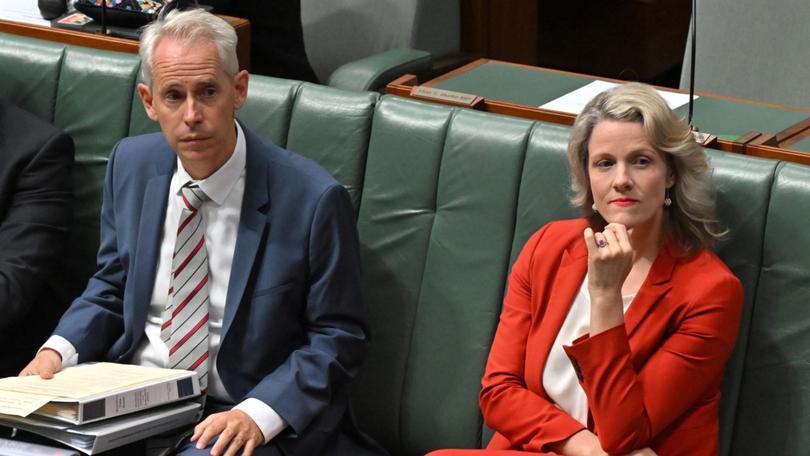New immigration bill making it easier for Federal Government to deport non-citizens blocked by Opposition
Efforts to strengthen rules to deport non-citizens have descended into an ugly political debate that will now be pushed to after the next High Court challenge on immigration detention.

Efforts to strengthen rules to deport non-citizens have descended into an ugly political debate that will now be pushed to after the next High Court challenge on immigration detention.
The Albanese Government failed in its bid to rush an emergency detainee bill through Parliament that will make it easier for the Federal Government to deport non-citizens failing to cooperate with authorities.
The Coalition and the Greens teamed up on Wednesday to delay the bill by referring it to a parliamentary inquiry for scrutiny with the committee to report back on May 7.
Sign up to The Nightly's newsletters.
Get the first look at the digital newspaper, curated daily stories and breaking headlines delivered to your inbox.
By continuing you agree to our Terms and Privacy Policy.This means the earliest Labor could pass the laws will be the week of the Federal budget on May 14.
Home Affairs Minister Clare O’Neil accused the Coalition of playing politics and said it was in the national interest for the tighter ministerial powers to become law for the sake of a functioning migration system.
“This is one of the most common-sense things that I have seen come before the Parliament... the reason we need it is we seek to run an orderly migration system in this country,” Ms O’Neil said.
“We have a Government here trying to do something in the national interest and an Opposition that chooses politics every day of the week, and it is destructive and it needs to stop.”
There was pressure from Labor to have the laws passed through the Senate by Wednesday, despite only giving MPs 36 hours to debate the bill, before Parliament rises for a six-week pre-budget break.
Immigration Minister Andrew Giles introduced the bill to Parliament on Tuesday to give the Government control to impose a prison sentence of one to five years on asylum seekers who refuse to cooperate with their deportation.
People found to be owed asylum cannot be directed to interact with or be deported to the country they have sought protection from but they can be told to do the things necessary to send them to a third country.
The Government says the ban on visas from certain countries would send a message to those countries that Australia expects them to take back their own citizens even if they don’t want to be deported.
An immigration minister could only designate a country after consulting with the Prime Minister and foreign minister.
As well, the Commonwealth would be able to block new visa applications from anyone — such as academics or tourists — seeking to come to Australia from places designated as “removal concern countries”, which are likely to include Iran, Russia and South Sudan.
Shadow Home Affairs minister James Paterson said the Opposition was not supporting the Government’s legislation because it needed more time to scrutinise it.
“They decided to drop it on us on a Tuesday morning with a three-day sitting week and say take it or leave it without proper scrutiny and I think that’s an abuse of process and one we are not willing to be party to,” he said.
“They could have given us this legislation last week. We might have been able to manage this in an orderly way if they did so.”
Shadow immigration minister Dan Tehan said the laws were “botched, chaotic and shambolic” and were being rushed through without proper explanation.
He flagged Parliament could be recalled to deal with the bill.
The Bill was rammed through the Lower House on Tuesday with the Opposition’s support before department officials faced a two-hour parliamentary committee hearing on the legislation.
“We genuinely hoped that that would answer our questions... and allow us to support the legislation today,” Senator Paterson said.
“In good faith, we tried to work with the government. They weren’t able to work with us. They didn’t provide the information that we needed.
“They couldn’t explain how many people this would affect, they couldn’t explain what the consequences of this would be for any upcoming High Court cases, they couldn’t explain how or when they would use this legislation.”
The Department has been working on the legislation since March 5.
It was also reported on Wednesday that Home Affairs Secretary Stephanie Foster left Ms O’Neil’s office in tears after a discussion about a document that detailed the criminal records of immigration detainees.
Ms O’Neil said the pair enjoyed “a very warm and collaborative relationship” and “had an enormous job to deal with because we are together managing a department which was left in a catastrophic mass by the Leader of the Opposition”.
A High Court case next month about an Iranian man, known as ASF17, who is refusing to cooperate with the Government because he fears he would be harmed if he was deported back to Iran, has prompted Labor to bring on the tough new deportation laws.
There are fears if the Commonwealth loses the case it could result in more than 170 people being released from immigration detention. The matter will be heard on April 17, in the middle of Parliament’s six-week pre-budget break.
Attorney-General Mark Dreyfus asked the High Court in February to hear the ASF17 case, instead of the Federal Court, to clear up the points of law.
The High Court blindsided the Government last year when it made oral orders at the end of a hearing that indefinite immigration detention was unconstitutional, without publishing its reasons for the decision that could inform legislative fixes.
